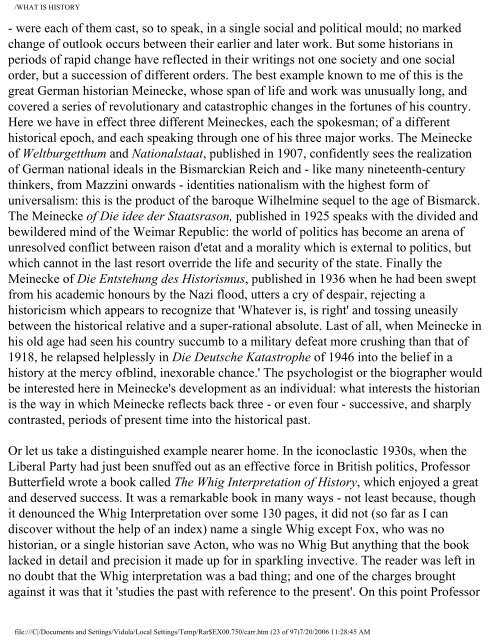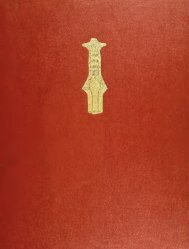What is History / by Edward Hallett Carr - Universal History Library
What is History / by Edward Hallett Carr - Universal History Library
What is History / by Edward Hallett Carr - Universal History Library
You also want an ePaper? Increase the reach of your titles
YUMPU automatically turns print PDFs into web optimized ePapers that Google loves.
WHAT IS HISTORY<br />
- were each of them cast, so to speak, in a single social and political mould; no marked<br />
change of outlook occurs between their earlier and later work. But some h<strong>is</strong>torians in<br />
periods of rapid change have reflected in their writings not one society and one social<br />
order, but a succession of different orders. The best example known to me of th<strong>is</strong> <strong>is</strong> the<br />
great German h<strong>is</strong>torian Meinecke, whose span of life and work was unusually long, and<br />
covered a series of revolutionary and catastrophic changes in the fortunes of h<strong>is</strong> country.<br />
Here we have in effect three different Meineckes, each the spokesman; of a different<br />
h<strong>is</strong>torical epoch, and each speaking through one of h<strong>is</strong> three major works. The Meinecke<br />
of Weltburgetthum and Nationalstaat, publ<strong>is</strong>hed in 1907, confidently sees the realization<br />
of German national ideals in the B<strong>is</strong>marckian Reich and - like many nineteenth-century<br />
thinkers, from Mazzini onwards - identities national<strong>is</strong>m with the highest form of<br />
universal<strong>is</strong>m: th<strong>is</strong> <strong>is</strong> the product of the baroque Wilhelmine sequel to the age of B<strong>is</strong>marck.<br />
The Meinecke of Die idee der Staatsrason, publ<strong>is</strong>hed in 1925 speaks with the divided and<br />
bewildered mind of the Weimar Republic: the world of politics has become an arena of<br />
unresolved conflict between ra<strong>is</strong>on d'etat and a morality which <strong>is</strong> external to politics, but<br />
which cannot in the last resort override the life and security of the state. Finally the<br />
Meinecke of Die Entstehung des H<strong>is</strong>tor<strong>is</strong>mus, publ<strong>is</strong>hed in 1936 when he had been swept<br />
from h<strong>is</strong> academic honours <strong>by</strong> the Nazi flood, utters a cry of despair, rejecting a<br />
h<strong>is</strong>toric<strong>is</strong>m which appears to recognize that '<strong>What</strong>ever <strong>is</strong>, <strong>is</strong> right' and tossing uneasily<br />
between the h<strong>is</strong>torical relative and a super-rational absolute. Last of all, when Meinecke in<br />
h<strong>is</strong> old age had seen h<strong>is</strong> country succumb to a military defeat more crushing than that of<br />
1918, he relapsed helplessly in Die Deutsche Katastrophe of 1946 into the belief in a<br />
h<strong>is</strong>tory at the mercy ofblind, inexorable chance.' The psycholog<strong>is</strong>t or the biographer would<br />
be interested here in Meinecke's development as an individual: what interests the h<strong>is</strong>torian<br />
<strong>is</strong> the way in which Meinecke reflects back three - or even four - successive, and sharply<br />
contrasted, periods of present time into the h<strong>is</strong>torical past.<br />
Or let us take a d<strong>is</strong>tingu<strong>is</strong>hed example nearer home. In the iconoclastic 1930s, when the<br />
Liberal Party had just been snuffed out as an effective force in Brit<strong>is</strong>h politics, Professor<br />
Butterfield wrote a book called The Whig Interpretation of H<strong>is</strong>tory, which enjoyed a great<br />
and deserved success. It was a remarkable book in many ways - not least because, though<br />
it denounced the Whig Interpretation over some 130 pages, it did not (so far as I can<br />
d<strong>is</strong>cover without the help of an index) name a single Whig except Fox, who was no<br />
h<strong>is</strong>torian, or a single h<strong>is</strong>torian save Acton, who was no Whig But anything that the book<br />
lacked in detail and prec<strong>is</strong>ion it made up for in sparkling invective. The reader was left in<br />
no doubt that the Whig interpretation was a bad thing; and one of the charges brought<br />
against it was that it 'studies the past with reference to the present'. On th<strong>is</strong> point Professor<br />
file:///C|/Documents and Settings/Vidula/Local Settings/Temp/Rar$EX00.750/carr.htm (23 of 97)7/20/2006 11:28:45 AM







